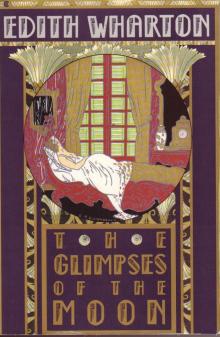- Home
- Edith Wharton
The Glimpses of the Moon Page 8
The Glimpses of the Moon Read online
Page 8
VIII.
IT was not Mrs. Vanderlyn's fault if, after her arrival, her palaceseemed to belong any less to the Lansings.
She arrived in a mood of such general benevolence that it was impossiblefor Susy, when they finally found themselves alone, to make her vieweven her own recent conduct in any but the most benevolent light.
"I knew you'd be the veriest angel about it all, darling, because I knewyou'd understand me--especially now," she declared, her slim handsin Susy's, her big eyes (so like Clarissa's) resplendent with pastpleasures and future plans.
The expression of her confidence was unexpectedly distasteful to SusyLansing, who had never lent so cold an ear to such warm avowals. She hadalways imagined that being happy one's self made one--as Mrs. Vanderlynappeared to assume--more tolerant of the happiness of others, of howeverdoubtful elements composed; and she was almost ashamed of responding solanguidly to her friend's outpourings. But she herself had no desire toconfide her bliss to Ellie; and why should not Ellie observe a similarreticence?
"It was all so perfect--you see, dearest, I was meant to be happy,"that lady continued, as if the possession of so unusual a characteristicsingled her out for special privileges.
Susy, with a certain sharpness, responded that she had always supposedwe all were.
"Oh, no, dearest: not governesses and mothers-in-law and companions, andthat sort of people. They wouldn't know how if they tried. But you andI, darling--"
"Oh, I don't consider myself in any way exceptional," Susy intervened.She longed to add: "Not in your way, at any rate--" but a few minutesearlier Mrs. Vanderlyn had told her that the palace was at her disposalfor the rest of the summer, and that she herself was only going to perchthere--if they'd let her!--long enough to gather up her things andstart for St. Moritz. The memory of this announcement had the effect ofcurbing Susy's irony, and of making her shift the conversation to thesafer if scarcely less absorbing topic of the number of day and eveningdresses required for a season at St. Moritz.
As she listened to Mrs. Vanderlyn--no less eloquent on this themethan on the other--Susy began to measure the gulf between her past andpresent. "This is the life I used to lead; these are the things I usedto live for," she thought, as she stood before the outspread glories ofMrs. Vanderlyn's wardrobe. Not that she did not still care: she couldnot look at Ellie's laces and silks and furs without picturing herselfin them, and wondering by what new miracle of management she could giveherself the air of being dressed by the same consummate artists. Butthese had become minor interests: the past few months had given her anew perspective, and the thing that most puzzled and disconcerted herabout Ellie was the fact that love and finery and bridge and dining-outwere seemingly all on the same plane to her.
The inspection of the dresses lasted a long time, and was marked bymany fluctuations of mood on the part of Mrs. Vanderlyn, who passedfrom comparative hopefulness to despair at the total inadequacy of herwardrobe. It wouldn't do to go to St. Moritz looking like a frump, andyet there was no time to get anything sent from Paris, and, whatever shedid, she wasn't going to show herself in any dowdy re-arrangements doneat home. But suddenly light broke on her, and she clasped her handsfor joy. "Why, Nelson'll bring them--I'd forgotten all about Nelson!There'll be just time if I wire to him at once."
"Is Nelson going to join you at St. Moritz?" Susy asked, surprised.
"Heavens, no! He's coming here to pick up Clarissa and take her to somestuffy cure in Austria with his mother. It's too lucky: there's justtime to telegraph him to bring my things. I didn't mean to wait for him;but it won't delay me more than day or two."
Susy's heart sank. She was not much afraid of Ellie alone, but Ellie andNelson together formed an incalculable menace. No one could tell whatspark of truth might dash from their collision. Susy felt that she coulddeal with the two dangers separately and successively, but not togetherand simultaneously.
"But, Ellie, why should you wait for Nelson? I'm certain to find someonehere who's going to St. Moritz and will take your things if he bringsthem. It's a pity to risk losing your rooms."
This argument appealed for a moment to Mrs. Vanderlyn. "That'strue; they say all the hotels are jammed. You dear, you're alwaysso practical!" She clasped Susy to her scented bosom. "And you know,darling, I'm sure you'll be glad to get rid of me--you and Nick! Oh,don't be hypocritical and say 'Nonsense!' You see, I understand... Iused to think of you so often, you two... during those blessed weekswhen we two were alone...."
The sudden tears, brimming over Ellie's lovely eyes, and threatening tomake the blue circles below them run into the adjoining carmine, filledSusy with compunction.
"Poor thing--oh, poor thing!" she thought; and hearing herself calledby Nick, who was waiting to take her out for their usual sunset on thelagoon, she felt a wave of pity for the deluded creature who wouldnever taste that highest of imaginable joys. "But all the same," Susyreflected, as she hurried down to her husband, "I'm glad I persuaded hernot to wait for Nelson."
Some days had elapsed since Susy and Nick had had a sunset tothemselves, and in the interval Susy had once again learned the superiorquality of the sympathy that held them together. She now viewed all therest of life as no more than a show: a jolly show which it would havebeen a thousand pities to miss, but which, if the need arose, they couldget up and leave at any moment--provided that they left it together.
In the dusk, while their prow slid over inverted palaces, and throughthe scent of hidden gardens, she leaned against him and murmured, hermind returning to the recent scene with Ellie: "Nick, should you hate medreadfully if I had no clothes?"
Her husband was kindling a cigarette, and the match lit up the grinwith which he answered: "But, my dear, have I ever shown the slightestsymptom--?"
"Oh, rubbish! When a woman says: 'No clothes,' she means: 'Not the rightclothes.'"
He took a meditative puff. "Ah, you've been going over Ellie's finerywith her."
"Yes: all those trunks and trunks full. And she finds she's got nothingfor St. Moritz!"
"Of course," he murmured, drowsy with content, and manifesting but alanguid interest in the subject of Mrs. Vanderlyn's wardrobe.
"Only fancy--she very nearly decided to stop over for Nelson's arrivalnext week, so that he might bring her two or three more trunkfuls fromParis. But mercifully I've managed to persuade her that it would befoolish to wait."
Susy felt a hardly perceptible shifting of her husband's lounging body,and was aware, through all her watchful tentacles, of a widening of hishalf-closed lids.
"You 'managed'--?" She fancied he paused on the word ironically. "Butwhy?"
"Why--what?"
"Why on earth should you try to prevent Ellie's waiting for Nelson, iffor once in her life she wants to?"
Susy, conscious of reddening suddenly, drew back as though the leapof her tell-tale heart might have penetrated the blue flannel shoulderagainst which she leaned.
"Really, dearest--!" she murmured; but with a sudden doggedness herenewed his "Why?"
"Because she's in such a fever to get to St. Moritz--and in such a funklest the hotel shouldn't keep her rooms," Susy somewhat breathlesslyproduced.
"Ah--I see." Nick paused again. "You're a devoted friend, aren't you!"
"What an odd question! There's hardly anyone I've reason to be moredevoted to than Ellie," his wife answered; and she felt his contriteclasp on her hand.
"Darling! No; nor I--. Or more grateful to for leaving us alone in thisheaven."
Dimness had fallen on the waters, and her lifted lips met his bendingones.
Trailing late into dinner that evening, Ellie announced that, after all,she had decided it was safest to wait for Nelson.
"I should simply worry myself ill if I weren't sure of getting mythings," she said, in the tone of tender solicitude with which shealways discussed her own difficulties. "After all, people who denythemselves everything do get warped and bitter, don't they?" she arguedplaintively, her lovely eyes wandering from one to the
other of herassembled friends.
Strefford remarked gravely that it was the complaint which had fatallyundermined his own health; and in the laugh that followed the partydrifted into the great vaulted dining-room.
"Oh, I don't mind your laughing at me, Streffy darling," his hostessretorted, pressing his arm against her own; and Susy, receiving theshock of their rapidly exchanged glance, said to herself, with a sharptwinge of apprehension: "Of course Streffy knows everything; he showedno surprise at finding Ellie away when he arrived. And if he knows,what's to prevent Nelson's finding out?" For Strefford, in a mood ofmischief, was no more to be trusted than a malicious child.
Susy instantly resolved to risk speaking to him, if need be evenbetraying to him the secret of the letters. Only by revealing the depthof her own danger could she hope to secure his silence.
On the balcony, late in the evening, while the others were listeningindoors to the low modulations of a young composer who had embroideredhis fancies on Browning's "Toccata," Susy found her chance. Strefford,unsummoned, had followed her out, and stood silently smoking at herside.
"You see, Streff--oh, why should you and I make mysteries to eachother?" she suddenly began.
"Why, indeed: but do we?"
Susy glanced back at the group around the piano. "About Ellie, Imean--and Nelson."
"Lord! Ellie and Nelson? You call that a mystery? I should as soon applythe term to one of the million candle-power advertisements that adornyour native thoroughfares."
"Well, yes. But--" She stopped again. Had she not tacitly promised Ellienot to speak?
"My Susan, what's wrong?" Strefford asked.
"I don't know...."
"Well, I do, then: you're afraid that, if Ellie and Nelson meet here,she'll blurt out something--injudicious."
"Oh, she won't!" Susy cried with conviction.
"Well, then--who will! I trust that superhuman child not to. And you andI and Nick--"
"Oh," she gasped, interrupting him, "that's just it. Nick doesn'tknow... doesn't even suspect. And if he did...."
Strefford flung away his cigar and turned to scrutinize her. "I don'tsee--hanged if I do. What business is it of any of us, after all?"
That, of course, was the old view that cloaked connivance in an air ofdecency. But to Susy it no longer carried conviction, and she hesitated.
"If Nick should find out that I know...."
"Good Lord--doesn't he know that you know? After all, I suppose it's notthe first time--"
She remained silent.
"The first time you've received confidences--from married friends. DoesNick suppose you've lived even to your tender age without... Hang it,what's come over you, child?"
What had, indeed, that she could make clear to him? And yet more thanever she felt the need of having him securely on her side. Once his wordwas pledged, he was safe: otherwise there was no limit to his capacityfor wilful harmfulness.
"Look here, Streff, you and I know that Ellie hasn't been away for acure; and that if poor Clarissa was sworn to secrecy it was not becauseit 'worries father' to think that mother needs to take care of herhealth." She paused, hating herself for the ironic note she had tried tosound.
"Well--?" he questioned, from the depths of the chair into which he hadsunk.
"Well, Nick doesn't... doesn't dream of it. If he knew that we owed oursummer here to... to my knowing...."
Strefford sat silent: she felt his astonished stare through thedarkness. "Jove!" he said at last, with a low whistle Susy bent over thebalustrade, her heart thumping against the stone rail.
"What was left of soul, I wonder--?" the young composer's voice shrilledthrough the open windows.
Strefford sank into another silence, from which he roused himself onlyas Susy turned back toward the lighted threshold.
"Well, my dear, we'll see it through between us; you and I-andClarissa," he said with his rasping laugh, rising to follow her. Hecaught her hand and gave it a short pressure as they re-entered thedrawing-room, where Ellie was saying plaintively to Fred Gillow: "I cannever hear that thing sung without wanting to cry like a baby."

 The Age of Innocence
The Age of Innocence The Reef
The Reef Summer
Summer The Glimpses of the Moon
The Glimpses of the Moon Xingu
Xingu The Fruit of the Tree
The Fruit of the Tree Fast and Loose
Fast and Loose Artemis to Actaeon and Other Verse
Artemis to Actaeon and Other Verse The Line of Least Resistance
The Line of Least Resistance The Lamp of Psyche
The Lamp of Psyche The Reckoning
The Reckoning Afterward
Afterward The New York Stories of Edith Wharton
The New York Stories of Edith Wharton The 2014 Halloween Horrors Megapack
The 2014 Halloween Horrors Megapack 'Copy': A Dialogue
'Copy': A Dialogue The Recovery
The Recovery The Fulness of Life
The Fulness of Life Early Short Stories Vol. 1
Early Short Stories Vol. 1 Tales of Men and Ghosts
Tales of Men and Ghosts The House of the Dead Hand
The House of the Dead Hand That Good May Come
That Good May Come The Buccaneers
The Buccaneers Other Times, Other Manners
Other Times, Other Manners The Hermit and the Wild Woman
The Hermit and the Wild Woman Kerfol
Kerfol The Duchess at Prayer
The Duchess at Prayer Bunner Sisters
Bunner Sisters The Choice
The Choice Madame De Treymes
Madame De Treymes Ethan Frome, Summer, Bunner Sisters
Ethan Frome, Summer, Bunner Sisters In Morocco
In Morocco The Valley of Decision
The Valley of Decision Age of Innocence (Barnes & Noble Classics Series)
Age of Innocence (Barnes & Noble Classics Series) The Angel at the Grave
The Angel at the Grave April Showers
April Showers Sanctuary
Sanctuary The Bunner Sisters
The Bunner Sisters Mrs. Manstey's View
Mrs. Manstey's View Writing a War Story
Writing a War Story The Custom of the Country
The Custom of the Country In Trust
In Trust The Triumph of the Night
The Triumph of the Night The Hermit and the Wild Woman, and Other Stories
The Hermit and the Wild Woman, and Other Stories Roman Fever and Other Stories
Roman Fever and Other Stories The Mission of Jane
The Mission of Jane The Descent of Man and Other Stories
The Descent of Man and Other Stories Coming Home
Coming Home The Touchstone
The Touchstone Early Short Stories Vol. 2
Early Short Stories Vol. 2 Edith Wharton's Verse, 1879-1919, from various journals.
Edith Wharton's Verse, 1879-1919, from various journals.